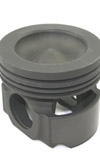Steel monotherm diesel race piston
 The piston lives at the interface of two hostile environments. One dominated by extreme temperature and pressure, and the other by inertia, kinetic energy and friction.Piston development is an unceasing challenge for the powertrain engineer and the tools of his trade are to be found in many diverse areas, spanning a whole gamut of bespoke materials, advanced tribological solutions, surface topography, treatments and finishes through to the ingenious oil cooling solutions found in modern day diesel pistons.
The piston lives at the interface of two hostile environments. One dominated by extreme temperature and pressure, and the other by inertia, kinetic energy and friction.Piston development is an unceasing challenge for the powertrain engineer and the tools of his trade are to be found in many diverse areas, spanning a whole gamut of bespoke materials, advanced tribological solutions, surface topography, treatments and finishes through to the ingenious oil cooling solutions found in modern day diesel pistons.
The burden of piston research and development is predominantly the responsibility of the Tier 1 component suppliers. Their scope of products ranges from lawnmower and small stationary engines through to Formula One gasoline, high speed and racing diesel engines. High speed diesel applications present a particular challenge to the engineers as the current and future generation of engines start to exceed the 200 bar cylinder pressure threshold. It’s at these extreme pressure domains that aluminium based pistons find it difficult to survive.In an effort to overcome the material limitations of aluminium based pistons, manufacturers have been actively investigating the use of steel as the base material for use in small capacity diesels. In the world of large diesel engines however, the use of steel is not uncommon. Typically these heavy duty pistons comprise a two part articulated assembly, the steel section embodying the combustion chamber, ring pack and pin bosses and the aluminium part providing the main skirt section and piston to liner thrust face.However, these complex two part piston assemblies are very expensive to manufacture and typically extremely heavy and robust. And so they need to be, as they are expected to have a life expectancy in large commercial vehicles exceeding 10 years and covering up to million kilometres.Although the articulated piston provides a solution for heavy duty diesels, weight and cost considerations make it unviable for small capacity diesel engines, so for a good many years now companies like Mahle, Federal-Mogul and Kolbenschmidt have been working to produce viable steel piston solutions for passenger car sized engines.Mahle seems to have the technological edge in this area and when Audi and Peugeot decided each to use a diesel engine in their Le Mans Prototype, it was to Mahle that they both turned for an extreme duty steel race piston.The Mahle ‘Monotherm’ race piston is made of a single steel forging. It is extremely compact for a diesel piston and can achieve compression heights near to 50% of the cylinder diameter. As steel is more thermally stable than aluminium, reduced fitting clearances can be used leading to a better guidance of the piston and reduced levels of friction. In the case of a Le Mans Prototype application it is likely that some form of DLC coating was also used. The steel construction also provides better stability in the ring area, resulting in reduced oil consumption and blow-by.At present it’s unlikely we will see steel pistons used in gasoline race engines as the inertial loads, especially when one considers the 18,000 rpm operating limit of the current generation of Formula One engines, would be unacceptable. However, if the FIA has its way and we see the introduction of a four-cylinder, 2.0 litre ‘world engine’ in the near future, who knows? We may yet see the day when steel pistons are used in Formula One!